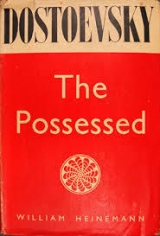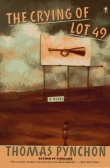
Текст книги "The Possessed"
Автор книги: Федор Достоевский
сообщить о нарушении
Текущая страница: 36 (всего у книги 49 страниц)
I decline to describe the scene that followed. To begin with there was a furious volley of applause. The applause did not come from all – probably from some fifth part of the audience – but they applauded furiously. The rest of the public made for the exit, but as the applauding part of the audience kept pressing forward towards the platform, there was a regular block. The ladies screamed, some of the girls began to cry and asked to go home. Lembke, standing up by his chair, kept gazing wildly about him. Yulia Mihailovna completely lost her head – for the first time during her career amongst us. As for Stepan Trofimovitch, for the first moment he seemed literally crushed by the divinity student's words, but he suddenly raised his arms as though holding them out above the public and yelled:
“I shake the dust from off my feet and I curse you. . . . It's the end, the end. . . .”
And turning, he ran behind the scenes, waving his hands menacingly.
“He has insulted the audience! . . . Verhovensky!” the angry section roared. They even wanted to rush in pursuit of It was impossible to appease them, at the moment, any way, and – a final catastrophe broke like a bomb on the assembly and exploded in its midst: the third reader, the maniac who kept waving his fist behind the scenes, suddenly ran on to the platform. He looked like a perfect madman. With a broad, triumphant smile, full of boundless self-confidence, he looked round at the agitated hall and he seemed to be delighted at the disorder. He was not in the least disconcerted at having to speak in such an uproar, on the contrary, he was obviously delighted. This was so obvious that it attracted attention at once.
“What's this now?” people were heard asking. “Who is this? Sh-h! What does he want to say?”
“Ladies and gentlemen,” the maniac shouted with all his might, standing at the very edge of the platform and speaking with almost as shrill, feminine a voice as Karmazinov's, but without the aristocratic lisp. “Ladies and gentlemen! Twenty years ago, on the eve of war with half Europe, Russia was regarded as an ideal country by officials of all ranks! Literature was in the service of the censorship; military drill was all that was taught at the universities; the troops were trained like a ballet, and the peasants paid the taxes and were mute under the lash of serfdom. Patriotism meant the wringing of bribes from the quick and the dead. Those who did not take bribes were looked upon as rebels because they disturbed the general harmony. The birch copses were extirpated in support of discipline. Europe trembled. . . . But never in the thousand years of its senseless existence had Russia sunk to such ignominy. . . .”
He raised his fist, waved it ecstatically and menacingly over his head and suddenly brought it down furiously, as though pounding an adversary to powder. A frantic yell rose from the whole hall, there was a deafening roar of applause; almost half the audience was applauding: their enthusiasm was excusable. Russia was being put to shame publicly, before every one. Who could fail to roar with delight?
“This is the real thing! Come, this is something like! Hurrah! Yes, this is none of your aesthetics!”
The maniac went on ecstatically:
“Twenty years have passed since then. Universities have been opened and multiplied. Military drill has passed into a legend; officers are too few by thousands, the railways have eaten up all the capital and have covered Russia as with a spider's web, so that in another fifteen years one will perhaps get somewhere. Bridges are rarely on fire, and fires in towns occur only at regular intervals, in turn, at the proper season. In the law courts judgments are as wise as Solomon's, and the jury only take bribes through the struggle for existence, to escape starvation. The serfs are free, and flog one another instead of being flogged by the land-owners. Seas and oceans of vodka are consumed to support the budget, and in Novgorod, opposite the ancient and useless St. Sophia, there has been solemnly put up a colossal bronze globe to celebrate a thousand years of disorder and confusion; Europe scowls and begins to be uneasy again. . . . Fifteen years of reforms! And yet never even in the most grotesque periods of its madness has Russia sunk . . .”
The last words could not be heard in the roar of the crowd. One could see him again raise his arm and bring it down triumphantly again. Enthusiasm was beyond all bounds: people yelled, clapped their hands, even some of the ladies shouted: “Enough, you can't beat that!” Some might have been drunk. The orator scanned them all and seemed revelling in his own triumph. I caught a glimpse of Lembke in indescribable excitement, pointing something out to somebody. Yulia Mihailovna, with a pale face, said something in haste to the prince, who had run up to her. But at that moment a group of six men, officials more or less, burst on to the platform, seized the orator and dragged him behind the scenes. I can't understand how he managed to tear himself away from them, but he did escape, darted up to the edge of the platform again and succeeded in shouting again, at the top of his voice, waving his fist: “But never has Russia sunk . . .”
But he was dragged away again. I saw some fifteen men dash behind the scenes to rescue him, not crossing the platform but breaking down the light screen at the side of it. . . . I saw afterwards, though I could hardly believe my eyes, the girl student (Virginsky's sister) leap on to the platform with the same roll under her arm, dressed as before, as plump and rosy as ever, surrounded by two or three women and two or three men, and accompanied by her mortal enemy, the schoolboy. I even caught the phrase:
“Ladies and gentlemen, I've come to call attention to the I sufferings of poor students and to rouse them to a general protest ...”
But I ran away. Hiding my badge in my pocket I made my way from the house into the street by back passages which I knew of. First of all, of course, I went to Stepan Trofimovitch's.
Last updated on Wed Jan 12 09:26:22 2011 for eBooks@Adelaide.
The Possessed, by Fyodor Dostoyevsky
Chapter II. The End of the Fete
HE WOULD NOT SEE ME. He had shut himself up and was writing. At my repeated knocks and appeals he answered through the door:
“My friend, I have finished everything. Who can ask anything more of me?”
“You haven't finished anything, you've only helped to make a mess of the whole thing. For God's sake, no epigrams, Stepan Trofimovitch! Open the door. We must take steps; they may still come and insult you. . . .”
I thought myself entitled to be particularly severe and even rigorous. I was afraid he might be going to do something still more mad. But to my surprise I met an extraordinary firmness.
“Don't be the first to insult me then. I thank you for the past, but I repeat I've done with all men, good and bad. I am writing to Darya Pavlovna, whom I've forgotten so unpardonably till now. You may take it to her to-morrow, if you like, now merci.”
“Stepan Trofimovitch, I assure you that the matter is more serious than you think. Do you think that you've crushed some one there? You've pulverised no one, but have broken yourself to pieces like an empty bottle.” (Oh, I was coarse and discourteous;. I remember it with regret.) “You've absolutely no reason to write to Darya Pavlovna . . . and what will you do with yourself without me? What do you understand about practical life? I expect you are plotting something else? You'll simply come to grief again if you go plotting something more. . . .”
He rose and came close up to the door.
“You've not been long with them, but you've caught the infection of their tone and language. Dieu vous pardonne, mon ami, et Dieu vous garde.But I've always seen in you the germs of delicate feeling, and you will get over it perhaps – apres le temps,of course, like all of us Russians. As for what you say about my impracticability, I'll remind you of a recent idea of mine: a whole mass of people in Russia do nothing whatever but attack other people's impracticability with the utmost fury and with the tiresome persistence of flies– in the summer, accusing every one of it except themselves Cher,remember that I am excited, and don't distress me. Once more mercifor everything, and let us part like Karmazinov and the public; that is, let us forget each other with as much generosity as we can. He was posing in begging his former readers so earnestly to forget him; quant a moi,I am not so conceited, and I rest my hopes on the youth of your inexperienced heart. How should you remember a useless old man for long? 'Live more,' my friend, as Nastasya wished me on my last name-day (ces pauvres gens ont quelquefois des mots charmants et pleins de philosophie).I do not wish you much happiness – it will bore you. I do not wish you trouble either, but, following the philosophy of the peasant, I will repeat simply 'live more' and try not to be much bored; this useless wish I add from myself. Well, good-bye, and good-bye for good. Don't stand at my door, I will not open it.”
He went away and I could get nothing more out of him. In spite of his “excitement,” he spoke smoothly, deliberately, with weight, obviously trying to be impressive. Of course he was rather vexed with me and was avenging himself indirectly, possibly even for the yesterday's “prison carts” and “floors that give way.” His tears in public that morning, in spite of a triumph of a sort, had put him, he knew, in rather a comic position, and there never was a man more solicitous of dignity and punctilio in his relations with his friends than Stepan Trofimovitch. Oh, I don't blame him. But this fastidiousness and irony which he preserved in spite of all shocks reassured me at the time. A man who Was so little different from his ordinary self was, of course, not in the mood at that moment for anything tragic or extraordinary. So I reasoned at the time, and, heavens, what a mistake I made! I left too much out of my reckoning.
In anticipation of events I will quote the few first lines of the letter to Darya Pavlovna, which she actually received the following day:
“Mon enfant, my hand trembles, but I've done with everything. You were not present at my last struggle: you did not come to that matinee, and you did well to stay away. But you will be told that in our Russia, which has grown so poor in men of character, one man had the courage to stand up and, in spite of deadly menaces showered on him from all sides, to tell the fools the truth, that is, that they are fools. Oh, ce sont– des pauvres petits vauriens et rien de plus, des petits– fools – voild le mot!The die is cast; I am going from this town for ever and I know not whither. Every one I loved has turned from me. But you, you are a pure and naive creature; you, a gentle being whose life has been all but linked with mine at the will of a capricious and imperious heart; you who looked at me perhaps with contempt when I shed weak tears on the eve of our frustrated marriage; you, who cannot in any case look on me except as a comic figure – for you, for you is the last cry of my heart, for you my last duty, for you alone! I cannot leave you for ever thinking of me as an ungrateful fool, a churlish egoist, as probably a cruel and ungrateful heart – whom, alas, I cannot forget – is every day describing me to you. . . .”
And so on and so on, four large pages.
Answering his “I won't open” with three bangs with my fist on the door, and shouting after him that I was sure he would send Nastasya for me three times that day, but I would not come, I gave him up and ran off to Yulia Mihailovna.
II
There I was the witness of a revolting scene: the poor woman was deceived to her face, and I could do nothing. Indeed, what could I say to her? I had had time to reconsider things a little and reflect that I had nothing to go upon but certain feelings and suspicious presentiments. I found her in tears, almost in hysterics, with compresses of eau-de-Cologne and a glass of water. Before her stood Pyotr Stepanovitch, who talked without stopping, and the prince, who held his tongue as though it had been under a lock. With tears and lamentations she reproached Pyotr Stepanovitch for his “desertion.” I was struck at once by the fact that she ascribed the whole failure, the whole ignominy of the matinee, everything in fact, to Pyotr Stepanovitch's absence.
In him I observed an important change: he seemed a shade too anxious, almost serious. As a rule he never seemed serious; he was always laughing, even when he was angry, and he was often angry. Oh, he was angry now! He was speaking coarsely, carelessly, with vexation and impatience. He said that he had been taken ill at Gaganov's lodging, where he had happened to go early in the morning. Alas, the poor woman was so anxious to be deceived again! The chief question which I found being discussed was whether the ball, that is, the whole second half of the fete, should or should not take place. Yulia Mihailovna could not be induced to appear at the ball “after the insults she had received that morning;” in other words, her heart was set on being compelled to do so, and by him, by Pyotr Stepanovitch. She looked upon him as an oracle, and I believe if he had gone away she would have taken to her bed at once. But he did not want to go away; he was desperately anxious that the ball should take place and that Yulia Mihailovna should be present at it.
“Come, what is there to cry about? Are you set on having a scene? On venting your anger on somebody? Well, vent it on me; only make haste about it, for the time is passing and you must make up your mind. We made a mess of it with the matinee; we'll pick up on the ball. Here, the prince thinks as I do. Yes, if it hadn't been for the prince, how would things have ended there?”
The prince had been at first opposed to the ball (that is, opposed to Yulia Mihailovna's appearing at it; the ball was bound to go on in any case), but after two or three such references to his opinion he began little by little to grunt his acquiescence.
I was surprised too at the extraordinary rudeness of Pyotr Stepanovitch's tone. Oh, I scout with indignation the contemptible slander which was spread later of some supposed liaison between Yulia Mihailovna and Pyotr Stepanovitch. There was no such thing, nor could there be. He gained his ascendency over her from the first only by encouraging her in her dreams of influence in society and in the ministry, by entering into her plans, by inventing them for her, and working upon her with the grossest flattery. He had got her completely into his toils and had become as necessary to her as the air she breathed. Seeing me, she cried, with flashing eyes:
“Here, ask him. He kept by my side all the while, just like the prince did. Tell me, isn't it plain that it was all a preconcerted plot, a base, designing plot to damage Andrey Antonovitch and me as much as possible? Oh, they had arranged it beforehand. They had a plan! It's a party, a regular party.”
“You are exaggerating as usual. You've always some romantic notion in your head. But I am glad to see Mr. ...” (He pretended to have forgotten my name.) “He'll give us his opinion.”
“My opinion,” I hastened to put in, “is the same as Yulia Mihailovna's. The plot is only too evident. I have brought you these ribbons, Yulia Mihailovna. Whether the ball is to take place or not is not my business, for it's not in my power to decide; but my part as steward is over. Forgive my warmth, but I can't act against the dictates of common sense and my own convictions.”
“You hear! You hear!” She clasped her hands.
“I hear, and I tell you this.” He turned to me. “I think you must have eaten something which has made you all delirious. To my thinking, nothing has happened, absolutely nothing but what has happened before and is always liable to happen in this town. A plot, indeed! It was an ugly failure, disgracefully stupid. But where's the plot? A plot against Yulia Mihailovna, who has spoiled them and protected them and fondly forgiven them all their schoolboy pranks! Yulia Mihailovna! What have I been hammering into you for the last month continually? What did I warn you? What did you want with all these people – what did you want with them? What induced you to mix yourself up with these fellows? What was the motive, what was the object of it? To unite society? But, mercy on us! will they ever be united?”
“When did you warn me? On the contrary, you approved of it, you even insisted on it. ... I confess I am so surprised. . . . You brought all sorts of strange people to see me yourself.”
“On the contrary, I opposed you; I did not approve of it. As for bringing them to see you, I certainly did, but only after they'd got in by dozens and only of late to make up 'the literary quadrille'– we couldn't get on without these rogues. Only I don't mind betting that a dozen or two more of the same sort were let in without tickets to-day.”
“Not a doubt of it,” I agreed.
“There, you see, you are agreeing already. Think what the tone has been lately here – I mean in this wretched town. It's nothing but insolence, impudence; it's been a crying scandal all the time. And who's been encouraging it? Who's screened it by her authority? Who's upset them all? Who has made all the small fry huffy? All their family secrets are caricatured in your album. Didn't you pat them on the back, your poets and caricaturists? Didn't you let Lyamshin kiss your hand? Didn't a divinity student abuse an actual state councillor in your presence and spoil his daughter's dress with his tarred boots? Now, can you wonder that the public is set against you?”
“But that's all your doing, yours! Oh, my goodness!”
“No, I warned you. We quarrelled. Do you hear, we quarrelled?”
“Why, you are lying to my face!”
“Of course it's easy for you to say that. You need a victim to vent your wrath on. Well, vent it on me as I've said already. I'd better appeal to you, Mr. . . .” (He was still unable to recall my name.) “We'll reckon on our fingers. I maintain that, apart from Liputin, there was nothing preconcerted, nothing! I will prove it, but first let us analyse Liputin. He came forward with that fool Lebyadkin's verses. Do you maintain that that was a plot? But do you know it might simply have struck Liputin as a clever thing to do. Seriously, seriously. He simply came forward with the idea of making every one laugh and entertaining them – his protectress Yulia Mihailovna first of all. That was all. Don't you believe it? Isn't that in keeping with all that has been going on here for the last month? Do you want me to tell the whole truth? I declare that under other circumstances it might have gone off all right. It was a coarse joke – well, a bit strong, perhaps; but it was amusing, you know, wasn't it?”
“What! You think what Liputin did was clever?” Yulia Mihailovna cried in intense indignation. “Such stupidity, such tactlessness, so contemptible, so mean! It was intentional! Oh, you are saying it on purpose! I believe after that you are in the plot with them yourself.”
“Of course I was behind the scenes, I was in hiding, I set it all going. But if I were in the plot – understand that, anyway – it wouldn't have ended with Liputin. So according to you I had arranged with my papa too that he should cause such a scene on purpose? Well, whose fault is it that my papa was allowed to read? Who tried only yesterday to prevent you from allowing it, only yesterday?”
“ Oh, hier il avait tant d'esprit,I was so reckoning on him; and then he has such manners. I thought with him and Karmazinov . . . Only think!
“Yes, only think. But in spite of tant d'espritpapa has made things worse, and if I'd known beforehand that he'd make such a mess of it, I should certainly not have persuaded you yesterday to keep the goat out of the kitchen garden, should I– since I am taking part in this conspiracy against your fete that you are so positive about? And yet I did try to dissuade you yesterday; I tried to because Iforesaw it. To foresee everything was, of course, impossible; he probably did not know himself a minute before what he would fire off – these nervous old men can't be reckoned on like other people. But you can still save the situation: to satisfy the public, send to him to-morrow by administrative order, and with all the ceremonies, two doctors to inquire into his health. Even to-day, in fact, and take him straight to the hospital and apply cold compresses. Every one would laugh, anyway, and see that there was nothing to take offence at. I'll tell people about it in the evening at the ball, as I am his son. Karmazinov is another story. He was a perfect ass and dragged out his article for a whole hour. He certainly must have been in the plot with me! 'I'll make a mess of it too,' he thought, 'to damage Yulia Mihailovna.' “
“Oh, Karmazinov! Quelle honte!I was burning, burning with shame for his audience!”
“Well, I shouldn't have burnt, but have cooked him instead. The audience was right, you know. Who was to blame for Karmazinov, again? Did I foist him upon you? Was I one of his worshippers? Well, hang him! But the third maniac, the political – that's a different matter. That was every one's blunder, not only my plot.”
“Ah, don't speak of it! That was awful, awful! That was my fault, entirely my fault!”
“Of course it was, but I don't blame you for that. No one can control them, these candid souls! You can't always be safe from them, even in Petersburg. He was recommended to you, and in what terms too! So you will admit that you are bound to appear at the ball to-night. It's an important business. It was you put him on to the platform. You must make it plain now to the public that you are not in league with him, that the fellow is in the hands of the police, and that you were in some inexplicable way deceived. You ought to declare with indignation that you were the victim of a madman. Because he is a madman and nothing more. That's how you must put it about him. I can't endure these people who bite. I say worse things perhaps, but not from the platform, you know. And they are talking about a senator too.”
“What senator? Who's talking?”
“I don't understand it myself, you know. Do you know anything about a senator, Yulia Mihailovna?”
“A senator?”
“You see, they are convinced that a senator has been appointed to be governor here, and that you are being superseded from Petersburg. I've heard it from lots of people.”
“I've heard it too,” I put in.
“Who said so?” asked Yulia Mihailovna, flushing all over.
“You mean, who said so first? How can I tell? But there it is, people say so. Masses of people are saying so. They were saying so yesterday particularly. They are all very serious about it, though I can't make it out. Of course the more intelligent and competent don't talk, but even some of those listen.”
“How mean! And . . . how stupid!”
“Well, that's just why you must make your appearance, to show these fools.”
“I confess I feel myself that it's my duty, but . . . what if there's another disgrace in store for us? What if people don't come? No one will come, you know, no one!”
“How hot you are! They not come! What about the new clothes? What about the girls' dresses? I give you up as a woman after that! Is that your knowledge of human nature?”
“The marshal's wife won't come, she won't.”
“But, after all, what has happened? Why won't they come?” he cried at last with angry impatience.
“Ignominy, disgrace – that's what's happened. I don't know what to call it, but after it I can't face people.”
“Why? How are you to blame for it, after all? Why do you take the blame of it on yourself? Isn't it rather the fault of the audience, of your respectable residents, your patresfamilias? They ought to have controlled the roughs and the rowdies – for it was all the work of roughs and rowdies, nothing serious. You can never manage things with the police alone in any society, anywhere. Among us every one asks for a special policeman to protect him wherever he goes. People don't understand that society must protect itself. And what do our patresfamilias, the officials, the wives and daughters, do in such cases? They sit quiet and sulk. In fact there's not enough social initiative to keep the disorderly in check.”
“Ah, that's the simple truth! They sit quiet, sulk and . . . gaze about them.”
“And if it's the truth, you ought to say so aloud, proudly, sternly, just to show that you are not defeated, to those respectable residents and mothers of families. Oh, you can do it; you have the gift when your head is clear. You will gather them round you and say it aloud. And then a paragraph in the Voiceand the Financial News.Wait a bit, I'll undertake it myself, I'll arrange it all for you. Of course there must be more superintendence: you must look after the buffet; you must ask the prince, you must ask Mr. . . . You must not desert us, monsieur, just when we have to begin all over again. And finally, you must appear arm-in-arm with Andrey Antonovitch. . . . How is Andrey Antonovitch?”
“Oh, how unjustly, how untruly, how cruelly you have always judged that angelic man!” Yulia Mihailovna cried in a sudden, outburst, almost with tears, putting her handkerchief to her eyes.
Pyotr Stepanovitch was positively taken aback for the moment. “Good heavens! I. ... What have I said? I've always . . .”
“You never have, never! You have never done him justice.”
“There's no understanding a woman,” grumbled Pyotr Stepanovitch, with a wry smile.
“He is the most sincere, the most delicate, the most angelic of men! The most kind-hearted of men!”
“Well, really, as for kind-heartedness . . . I've always done him justice. ...”
“Never! But let us drop it. I am too awkward in my defence of him. This morning that little Jesuit, the marshal's wife, also dropped some sarcastic hints about what happened yesterday.”
“Oh, she has no thoughts to spare for yesterday now, she is full of to-day. And why are you so upset at her not coming to the ball to-night? Of course, she won't come after getting mixed up in such a scandal. Perhaps it's not her fault, but still her reputation . . . her hands are soiled.”
“What do you mean; I don't understand? Why are her hands soiled?” Yulia Mihailovna looked at him in perplexity.
“I don't vouch for the truth of it, but the town is ringing with the story that it was she brought them together.”
“What do you mean? Brought whom together?”
“What, do you mean to say you don't know?” he exclaimed with well-simulated wonder.
“Why Stavrogin and Lizaveta Nikolaevna.”
“What? How?” we all cried out at once.
“Is it possible you don't know? Phew! Why, it is quite a tragic romance: Lizaveta Nikolaevna was pleased to get out of that lady's carriage and get straight into Stavrogin's carriage, and slipped off with 'the latter' to Skvoreshniki in full daylight. Only an hour ago, hardly an hour.”
We were flabbergasted. Of course we fell to questioning him, but to our wonder, although he “happened” to be a witness of the scene himself, he could give us no detailed account of it. The thing seemed to have happened like this: when the marshal's wife was driving Liza and Mavriky Nikolaevitch from the matinee to the house of Praskovya Ivanovna (whose legs were still bad) they saw a carriage waiting a short distance, about twenty-five paces, to one side of the front door. When Liza jumped out, she ran straight to this carriage; the door was flung open and shut again; Liza called to Mavriky Nikolaevitch, “Spare me,” and the carriage drove off at full speed to Skvoreshniki. To our hurried questions whether it was by arrangement? Who was in the carriage? Pyotr Stepanovitch answered that he knew nothing about it; no doubt it had been arranged, but that he did not see Stavrogin himself; possibly the old butler, Alexey Yegorytch, might have been in the carriage. To the question “How did he come to be there, and how did he know for a fact that she had driven to Skvoreshniki?” he answered that he happened to be passing and, at seeing Liza, he had run up to the carriage (and yet he could not make out who was in it, an inquisitive man like him!) and that Mavriky Nikolaevitch, far from setting off in pursuit, had not even tried to stop Liza, and had even laid a restraining hand on the marshal's wife, who was shouting at the top of her voice: “She is going to Stavrogin, to Stavrogin.” At this point I lost patience, and cried furiously to Pyotr Stepanovitch:
“It's all your doing, you rascal! This was what you were doing this morning. You helped Stavrogin, you came in the carriage, you helped her into it ... it was you, you, you! Yulia Mihailovna, he is your enemy; he will be your ruin too! Beware of him!”
And I ran headlong out of the house. I wonder myself and cannot make out to this day how I came to say that to him. But I guessed quite right: it had all happened almost exactly as I said, as appeared later. What struck me most was the obviously artificial way in which he broke the news. He had not told it at once on entering the house as an extraordinary piece of news, but pretended that we knew without his telling us which was impossible in so short a time. And if we had known it, we could not possibly have refrained from mentioning it till he introduced the subject. Besides, he could not have heard yet that the town was “ringing with gossip” about the marshal's wife in so short a time. Besides, he had once or twice given a vulgar, frivolous smile as he told the story, probably considering that we were fools and completely taken in.
But I had no thought to spare for him; the central fact I believed, and ran from Yulia Mihailovna's, beside myself. The catastrophe cut me to the heart. I was wounded almost to tears; perhaps I did shed some indeed. I was at a complete loss what to do. I rushed to Stepan Trofimovitch's, but the vexatious man still refused to open the door. Nastasya informed me, in a reverent whisper, that he had gone to bed, but I did not believe it. At Liza's house I succeeded in questioning the servants. They confirmed the story of the elopement, but knew nothing themselves. There was great commotion in the house; their mistress had been attacked by fainting fits, and Mavriky Nikolaevitch was with her. I did not feel it possible to ask for Mavriky Nikolaevitch. To my inquiries about Pyotr Stepanovitch they told me that he had been in and out continually of late, sometimes twice in the day. The servants were sad, and showed particular respectfulness in speaking of Liza; they were fond of her. That she was ruined, utterly ruined, I did not doubt; but the psychological aspect of the matter I was utterly unable to understand, especially after her scene with Stavrogin the previous day. To run about the town and inquire at the houses of acquaintances, who would, of course, by now have heard the news and be rejoicing at it, seemed to me revolting, besides being humiliating for Liza. But, strange to say, I ran to see Darya Pavlovna, though I was not admitted (no one had been admitted into the house since the previous morning). I don't know what I could have said to her and what made me run to her. From her I went to her brother's. Shatov listened sullenly and in silence. I may observe that I found him more gloomy than I had ever seen him before; he was awfully preoccupied and seemed only to listen to me with an effort. He said scarcely anything and began walking up and down his cell from corner to corner, treading more noisily than usual. As I was going down the stairs he shouted after me to go to Liputin's: “There you'll hear everything.” Yet I did not go to Liputin's, but after I'd gone a good way towards home I turned back to Shatov's again, and, half opening the door without going in, suggested to him laconically and with no kind of explanation, “Won't you go to Marya Timofyevna to-day?” At this Shatov swore at me, and I went away. I note here that I may not forget it that he did purposely go that evening to the other end of the town to see Marya Timofyevna, whom he had not seen for some time. He found her in excellent health and spirits and Lebyadkin dead drunk, asleep on the sofa in the first room. This was at nine o'clock. He told me so himself next day when we met for a moment in the street. Before ten o'clock I made up my mind to go to the ball, but not in the capacity of a steward (besides my rosette had been left at Yulia Mihailovna's). I was tempted by irresistible curiosity to listen, without asking any questions, to what people were saying in the town about all that had happened. I wanted, too, to have a look at Yulia Mihailovna, if only at a distance. I reproached myself greatly that I had left her so abruptly that afternoon.








